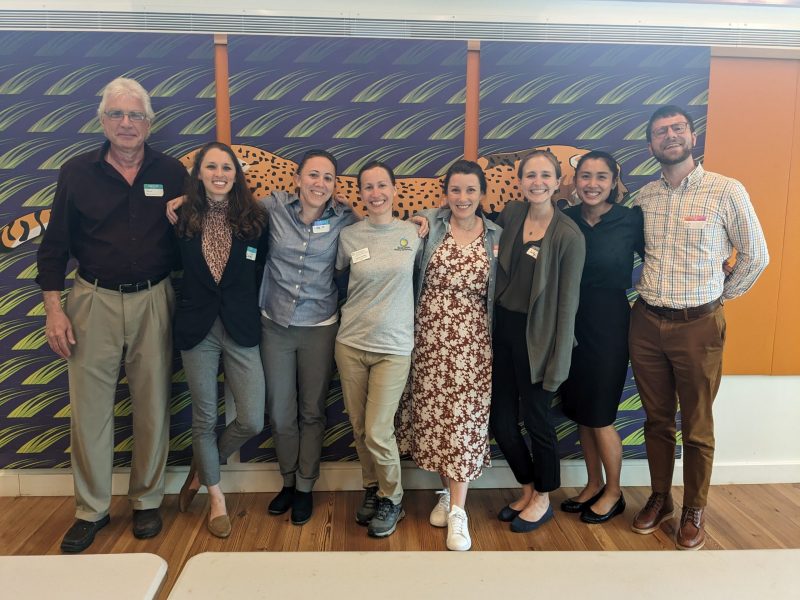Post-DVM Training in Comparative Pathology

Training of veterinary scientists in comparative medicine and pathology began in the mid-1960s at Johns Hopkins University School of Medicine. The Dept of Molecular and Comparative Pathobiology (formerly Comparative Medicine) obtained one of the first NIH Training Grants for postgraduate training of veterinarians and has been funded continuously for over 35 years. Our combination of intensive training in Comparative Pathology during the first year of the program, and research mentored by outstanding scientists in the final three years has proven highly successful. More than 110 veterinarians have been trained in the Department of Comparative Medicine (now the Department of Molecular and Comparative Pathobiology); many are now department chairs and leaders in academia and industry worldwide. Department faculty includes ACVP Diplomates, ACLAM Diplomates, and comparative medicine scientists.
Our faculty is currently comprised of 10 veterinarians with ACVP and/or ACLAM board certification plus additional PhD faculty. Research interests include virology, parasitology, neuropathology, immunology, cardiovascular disease, proteomics, RNA biology, rodent phenotyping, and laboratory animal medicine. Our postdoctoral fellows have a high pass rate on the Veterinary Pathology (ACVP) board examination and graduates enjoy satisfying careers at universities and other institutes of higher learning, as well as in industry and government.
In our comparative pathology training program, we offer two types of Postdoctoral Fellowships in Comparative Pathology. Both programs start July 1:
1. Research Emphasis, 4 year program, offered each year
2. Clinical Emphasis, 3 year program, offered once every three years
Research Emphasis Postdoctoral Fellowship in Comparative Pathology
This training is comparable to residency/PhD programs offered at veterinary schools and is distinguished by the broader research opportunities afforded by a large medical institution and the opportunity to pursue a PhD in a JHU graduate program. This is a 2-part program: three years of research training funded by the National Institutes of Health preceded by one year of pathology training funded by Research Animal Resources. The program prepares trainees for certification by the American College of Veterinary Pathologists (ACVP).
During the first year, trainees gain practical and diverse experience in anatomic pathology through gross and microscopic examination of pathology cases from the Johns Hopkins University animal colonies, from local practitioners and from the Maryland Zoo and National Aquarium in Baltimore. Diagnostic laboratories include necropsy, histology, clinical pathology, and state-of-the-art rodent phenotyping and small animal imaging cores. A unique feature of this program is a rotation in human pathology. Didactic training consists of weekly lectures and pathology seminars plus peer-mentored boards study, gross and histopathology practice, and journal club.
In the years 2 to 4, emphasis is on basic or translational research supervised by Molecular Comparative Pathobiology faculty or other faculty from more than 30 academic departments forming Johns Hopkins Medicine. During those three years, trainees also have the option to pursue a PhD through concurrent enrollment in any of several world-class graduate programs in the School of Medicine designed to provide closely mentored guidance in the process of conducting research. Pathology training continues throughout the program with weekly slide conferences, seminars, journal clubs and other courses in preparation for ACVP certification.
Years 2-4 of this program are generously supported by NIH T32 OD011089.
For more information, view our position announcement or contact our Academic Program Coordinator, Momina Malik, at 442-287-2953 or email her at dvmtraining@jhmi.edu
Clinical Emphasis Postdoctoral Fellowship in Comparative Pathology
This training is comparable to a three-year anatomic pathology residency offered at veterinary schools and other institutions. Funded by Research Animal Resources, this program provides outstanding anatomic pathology training, and prepares the resident to fulfill the requirements for certification by the American College of Veterinary Pathologists (ACVP). During these three years, the Postdoctoral Fellow in the Clinical Emphasis track gain practical and diverse experience in anatomic pathology, including phenotyping and pathology of genetically engineered rodents, through gross and microscopic examination of pathology cases from the Johns Hopkins University animal colonies, local practitioners, and from the Maryland Zoo and National Aquarium in Baltimore. Our Postdoctoral Fellows in the Clinical Emphasis track works alongside the Postdoctoral Fellows in the Research Emphasis track in peer-mentored boards study, gross and histopathology practice, and journal club. Like the Research Emphasis track fellows, Clinical Emphasis fellows participate in the medical school’s pathology service and conduct hypothesis-driven collaborative research.
For more information, view our position announcement. For more information, please email us at dvmtraining@jhmi.edu
Current Post-Doctoral Fellows:
Nathan Crilly (Research Emphasis) DVM, Dip ACVP
Ashleigh Shoemaker (Research Emphasis) DVM
Laine Feller (Research Emphasis) DVM
Emily Garrison (Research Emphasis) DVM
Katti Crakes (Clinical Emphasis) DVM, PhD
Lindsey Ferguson (Research Emphasis) DVM
Linnette Vasquez (Clinical Emphasis) DVM
